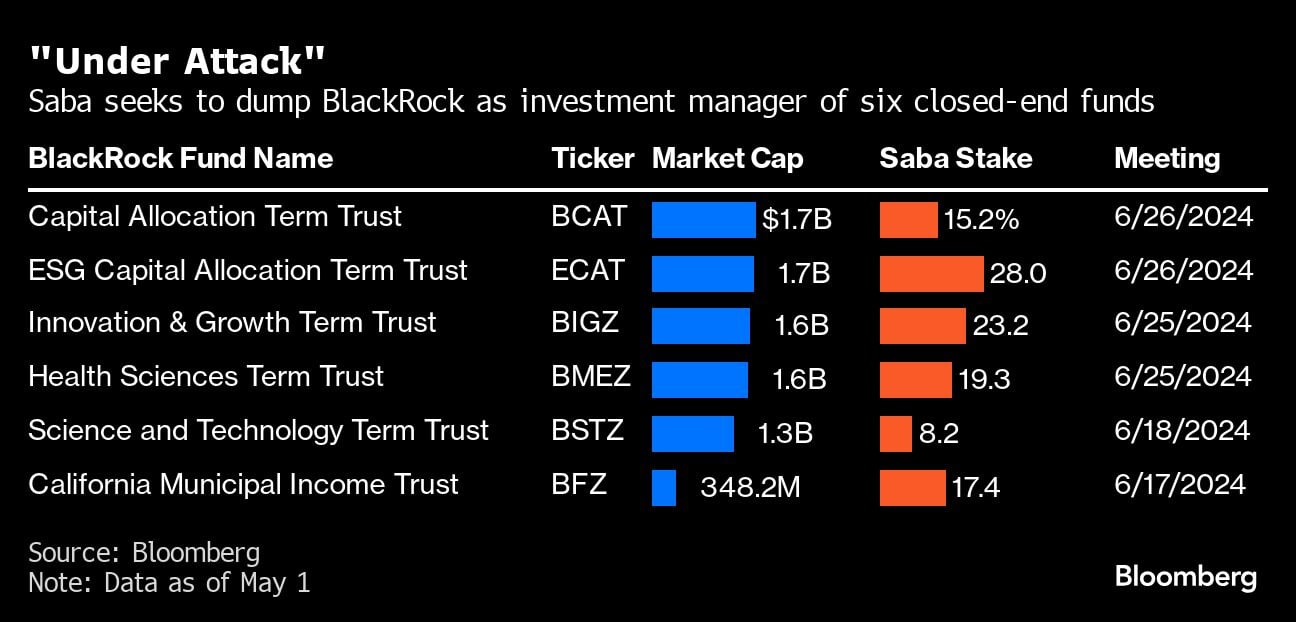'Your Fund Is Under Attack': BlackRock Fights Saba Raid

What You Need to Know
he $250 billion closed-end fund industry is now the scene of one of the most dramatic power struggles in finance.
Last month, Saba Capital Management launched a frenetic bid to have investors remove BlackRock as manager of six funds overseeing about $10 billion in assets.
BlackRock is warning investors that Saba could radically alter the composition of the funds should it win control, exposing shareholders to greater risk.
A few days ago, BlackRock Inc. sent an unusual message to thousands of clients. It contained none of the formulaic language or inscrutable fine print typically packed into these sorts of statements. No, this was a call to arms.
“Your fund is under attack,” the headline screamed in bold print.
The attacker: Boaz Weinstein, the sharp-elbowed Wall Street money manager who says price distortions in funds run by BlackRock and others are cheating investors out of billions of dollars, and they need to be eliminated.
This has turned into something of a crusade for Weinstein. Last month, his hedge fund, Saba Capital Management, launched a frenetic bid to have investors remove BlackRock as manager of six funds overseeing about $10 billion in assets.
Boaz Weinstein, founder and chief investment officer of Saba Capital Management Which is what triggered the note BlackRock sent to clients. “If Saba were to succeed, it may seek to appoint itself as investment advisor” and fundamentally disrupt the funds’ objectives and strategies, “all to enrich itself.”
The ongoing feud has turned the $250 billion closed-end fund industry, a normally sleepy Wall Street backwater, into the scene of one of the most dramatic power struggles in finance — one that’s coming to a head at shareholder meetings next month.
Weinstein says BlackRock is not only trapping shareholders in underperforming products, but also failing to meet basic governance standards by stymieing his efforts to elect new directors.
BlackRock points to Weinstein’s own track record, where he took over a closed-end fund that had previously invested in floating-rate loans and put some of its money into crypto exposure and SPACs.
Both sides vow they have the moral high ground.
“We need to show there’s a cost to illegally entrenching themselves to protect their management fees while doing terrible things to shareholders,” Weinstein said in an interview, adding that many of BlackRock’s closed-end funds have track record of “horrible performance.”
Weinstein’s move — echoing some of the most audacious corporate raids of the 1980s — is the latest escalation in a multiyear campaign targeting closed-end funds trading well below the value of their underlying assets.
The 50-year-old hedge fund boss currently has about $6 billion invested in the products, using his stakes in dozens of funds to press money managers to buy back shares near their full market value (known as a tender) or turn their funds into open-ended vehicles, which would produce a similar result.
In recent years he’s taken on the likes of Eaton Vance, Franklin Templeton and Voya Financial, convincing managers to tender, winning board seats and even prompting them to resign from their role as fund adviser.

Weinstein notes that if Saba were to win the proxy battles, it wouldn’t necessarily mean the hedge fund would assume management of the funds. That would be up to the boards, but Saba has said it would “stand ready” to assist and may offer to do the job.
In mid-2021, Saba took over the $600 million Voya Prime Rate Trust, now known as the Saba Capital Income & Opportunities Fund (ticker BRW) and changed its investment mandate after getting shareholder approval.
Following a pair of tender offers, the fund has returned an annualized 4.1%, more than triple its high-yield bond benchmark, according to data compiled by Bloomberg. It ranked third of 22 peer funds in 2022, 14th in 2023 and second-to-last this year through April, according to Morningstar Inc. data, which compares the product to US bank loan closed-end funds.
By comparison, the $1.6 billion BlackRock Innovation & Growth Term Trust (ticker BIGZ) has lost an annualized 23% over the same period, while the $1.7 billion BlackRock ESG Capital Allocation Term Trust (ticker ECAT) has gained an annualized 0.8% since its September 2021 inception.
BIGZ ranked either first or second in its Morningstar category of only two funds over the period; ECAT ranked sixth in 2022, second in 2023 and eighth this year through April in its group of 11 funds.
BlackRock is quick to point out that BIGZ and ECAT returned 19% and 32%, respectively, last year as markets rebounded broadly, and that it manages closed-end funds in the same Morningstar peer group as BRW that have had higher returns than the Saba fund in recent years.
Still, BIGZ and ECAT continue to trade significantly below their so-called net asset value, or NAV. BIGZ is currently at a 17% discount, while ECAT trades at a 10% discount, according to data compiled by Bloomberg. Saba’s BRW is at an 8.3% discount.

BlackRock is warning investors that Saba could radically alter the composition of the funds should it win control, exposing shareholders to greater risk.
After Saba took over BRW, it began adding everything from crypto exposure to SPACs to other closed-end funds Weinstein is campaigning against. BlackRock says Saba’s tactics have nothing to do with helping investors other than himself and his hedge fund clients.




